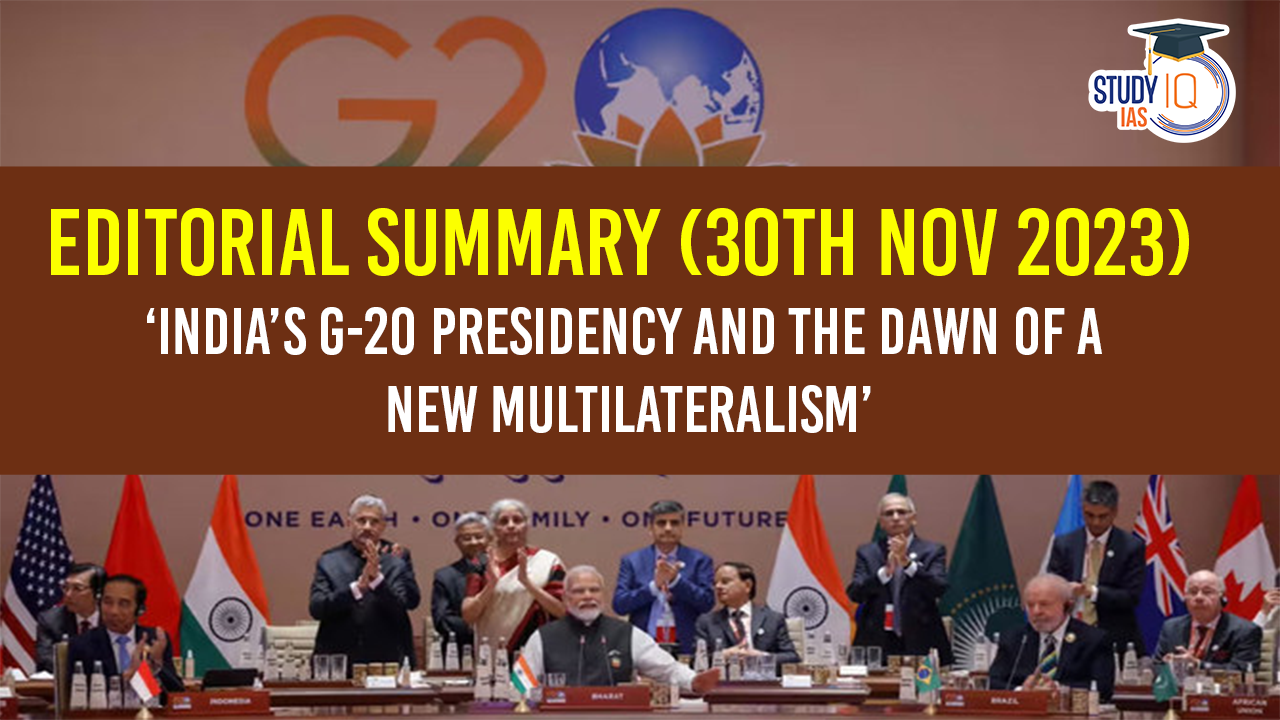‘India’s G-20 Presidency and the dawn of a new multilateralism’
Context: India’s presidency of the G-20 marked a significant year, characterised by efforts to address global challenges and promote a more inclusive and sustainable future.
We’re now on WhatsApp. Click to Join
Key Insights from India’s G-20 Presidency
- Focus on Inclusivity and Multilateralism: India’s approach as G-20 President was defined by inclusivity, ambition, action-orientation, and decisiveness.
- The New Delhi Leaders’ Declaration, unanimously adopted, reflects India’s commitment to these principles.
- The inclusion of the African Union (AU) as a permanent G-20 member exemplifies this inclusive approach, integrating 55 African nations and representing 80% of the global population.
- Voice of the Global South: India hosted the “Voice of the Global South Summit”, focusing on the concerns of developing countries and ensuring their active participation in shaping global narratives.
- This effort marks a new era in multilateralism where developing countries have a more significant voice.
- People’s Presidency and Domestic Involvement: Reflecting its status as the world’s largest democracy, India’s G-20 Presidency engaged its population through Jan Bhagidari (people’s participation) events, involving all states and union territories.
- Advancing the 2030 Agenda: India introduced the G-20 2023 Action Plan to Accelerate Progress on the Sustainable Development Goals (SDGs), emphasising a cross-cutting, action-oriented approach to issues like health, education, gender equality, and environmental sustainability.
- Digital Public Infrastructure (DPI): India led the completion of the Digital Public Infrastructure Repository, a global technological collaboration initiative featuring over 50 DPIs from 16 countries, to foster inclusive growth, especially in the Global South.
- Environmental Initiatives: The “Green Development Pact” in the Declaration focuses on balancing environmental protection with combating hunger, promoting climate-conscious consumption, and planet-friendly production.
- The G-20 also aims to triple global renewable energy capacity by 2030, establish the Global Biofuels Alliance, and push for Green Hydrogen.
- Commitment to Climate Justice: The G-20 recognized the need for substantial financial and technological support from the Global North to the developing world, acknowledging the $5.9 trillion requirement for developing countries to fulfil their Nationally Determined Contributions (NDCs) by 2030.
- Reforms and Gender Equality: India is advocating for UN reforms and the restructuring of bodies like the UN Security Council.
- The G-20’s focus on gender equality led to the formation of a Working Group on the Empowerment of Women.
- Domestically, India introduced the Women’s Reservation Bill, 2023, for reserving seats in Parliament and State Assemblies for women.
- Policy Coherence and Trade: The New Delhi Declaration emphasised policy coherence, reliable trade, and ambitious climate action.
- During India’s presidency, the G-20 achieved 87 outcomes and 118 adopted documents.
- Stance on Geopolitical Issues: India led discussions on geopolitical issues, emphasising zero tolerance for terrorism and civilian killings, advocating for humanitarianism over hostility, and reinforcing that this is not an era of war.


 List of Chief Ministers of Jammu and Kas...
List of Chief Ministers of Jammu and Kas...
 Cabinet Committee on Security Suspends I...
Cabinet Committee on Security Suspends I...
 Pahalgam Terror Attack: All Eyes on Paha...
Pahalgam Terror Attack: All Eyes on Paha...






















